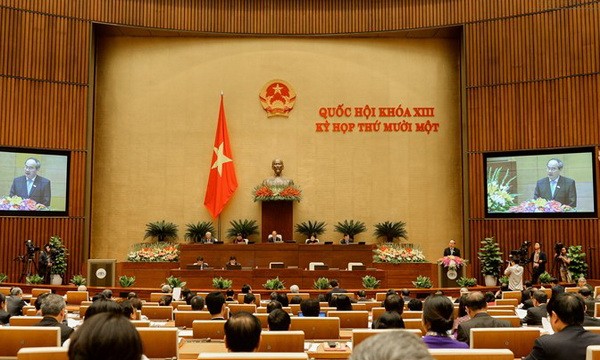(VOVworld)- The amended Press Law approved by the National Assembly on April 5, 2016, stipulates in detail the rights and duties of media practitioners and creates an important legal corridor for the development of the press in Vietnam.
 |
| The National Assembly debated amendments to the Press Law on March 21 (Photo: baohiemxahoi) |
The newly-approved Press Law has undergone 20 amendments. It regulates the right of citizens to freedom of the press and expression and strengthens the protection of media practitioners.
Creating a uniform legal framework
The amended Press Law governs the responsibilities of agencies, organizations and authorized persons to provide information to the media. To protect news sources and journalists’ right to do their jobs, the new law says a media agency or journalist has to reveal their source only when there is a written demand by an authorized agency and may ask a relevant agency to protect the source after their identification is revealed.
According to the 2016 Press Law, the media is protected by the law for their professional activities and eligible to visit agencies and organizations to practice journalism. Agencies and organizations are responsible for providing journalists documents which are not classified as state or personal secrets or otherwise secrets under the law. Persons who refuse to provide information to the media are subject to administrative punishment as stipulated by a government decree.
The amended Press Law makes clear that the media is protected by law and prohibits all acts of threatening, offending the dignity or morale of journalists, destroying or confiscating journalists’ documents and working tools, or obstructing journalists from doing their job in accordance with the law.
The new law also highlights the roles and responsibilities of journalists, and regulates their work ethics and prohibited behaviors in line with the 2015 Criminal Code, the Civil Code, and other laws.
Guaranteeing and expanding media’s multi-dimensional connectivity
It is noteworthy that the connectivity guarantees the audience’s benefits in terms of content and the media’s economic benefits, which was previously mentioned in legal normative documents.
Compared to the 1999 Press Law, the 2016 version expands the list of institutions eligible to establish media outlets. Private or foreign-invested educational, scientific, and technological organizations are allowed to issue scientific journals. A media agency is allowed to join ventures with other media agencies, legal entities and individuals whose business licenses match their areas of business without asking for permission from state agencies that manage the media. The new regulation aims to make full use of resources for the development of science.
The amended Press Law, which upholds the 2013 Constitution, will take effect on January 1, 2017.